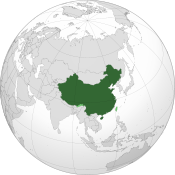More than 100 die in riots in Ürümqi, China
Wednesday, July 8, 2009
Uyghurs are involved in China's largest ethnic clash since March 2008, involving at first perhaps 1,000 and up to 3,000 protestors. Xinhua, the official news agency, reports that 156 people were killed and 1,080 other people are injured.

The riot began Sunday in Ürümqi, the capital city of the Xinjiang Uyghur Autonomous Region, in northwestern China. It began as a protest encouraging authorities to look into a previous violent incident between Uyghurs and Han Chinese in June. In the June incident, two Uyghur men were reportedly beaten to death by a mob at a Guangdong province toy factory. A rumour spread that the men had sexually harassed Han Chinese women. According to Chinese state media, police have arrested a man who allegedly spread the rumour. The June clash has been cited as the instigating factor to the Sunday riot, which escalated.
Authorities closed down Ürümqi with a population of over 2.3 million and neighbouring cities Monday and Tuesday morning. Protests had spread to Kashgar by Monday.
Police arriving on the scene tried to quell the unrest with tear gas, water hoses, road blocks, armoured vehicles and armed police patrols. Curfews were imposed, while cell phone and internet services were cut off.
Rioters were using knives, wooden batons, bricks, stones, and were igniting cars, buses, and buildings on fire. About 700 people had been detained by police as of Monday evening, 200 stores, over a dozen homes, and more than 250 vehicles were destroyed during the riot.
The changing global economics is affecting the social and economic ethnic tensions in China. One sentiment is that the "government does bald-faced injustice to Uyghur People," said a Uyghur student. "Uighurs have suffered for years under racial profiling and unjust government policies that have painted the entire Uyghur population as criminals and terrorists," said Rebiya Kadeer, a Uyghur and human rights proponent based in Washington. Uyghur demonstrators during this riot were seeking an end to discrimination and not separatism, according to Alim Seytoff, Uyghur American Association spokesperson. More radical Uyghur separatists have been seeking independence in China.
However, the Han have voiced opposite sentiments. “What they should do is crack down with a lot of force at first, so the situation doesn’t get worse, so it doesn’t drag out like in Tibet," said a Han woman. "Their mind is very simple. If you crack down on one, you’ll scare all of them. The government should come down harder," she continued.
Uyghurs asked for the release of ordinary citizens who were detained.
On Tuesday morning a small contingent of Uyghur gathered to urge the release of those detained following the Sunday riot.
Later in the day approximately 10,000 Han Chinese took to the streets in Ürümqi with poles, meat cleavers, machetes, bricks, chains and other weapons. "The Uighurs came to our area to smash things, now we are going to their area to beat them," said a Han Chinese protester. Police protected some neighborhoods with tear gas and road blocks.
By Tuesday over 1,400 had been detained.
Sources
- Dan Martin. "China's Urumqi city in chaos" — Brisbane Times, July 8, 2009
- Edward Wong. "New Protests in Western China After Deadly Clashes" — The New York Times, July 7, 2009
- "Death toll in Xinjiang riot rises to 156" — Xinhua News Agency, July 7, 2009
- Edward Wong. "Scores Killed in Clashes in Western China" — The New York Times, July 6, 2009
- "Civilians and armed police officer killed in NW China violence" — Xinhua News Agency, July 6, 2009
- "Order partially restored in violence-plagued Urumqi, situation still tense" — Xinhua News Agency, July 6, 2009
- Barbara Demick. "Chinese riot police, Muslims clash in northwestern city" — Los Angeles Times, July 5, 2009
- Agencies. "Civilians die in China riots" — Al Jazeera, July 5, 2009
- Gady Epstein. "Uighur Unrest" — Forbes, July 5, 2009
- Edward Wong. "Riots in Western China Amid Ethnic Tension" — The New York Times, July 5, 2009




